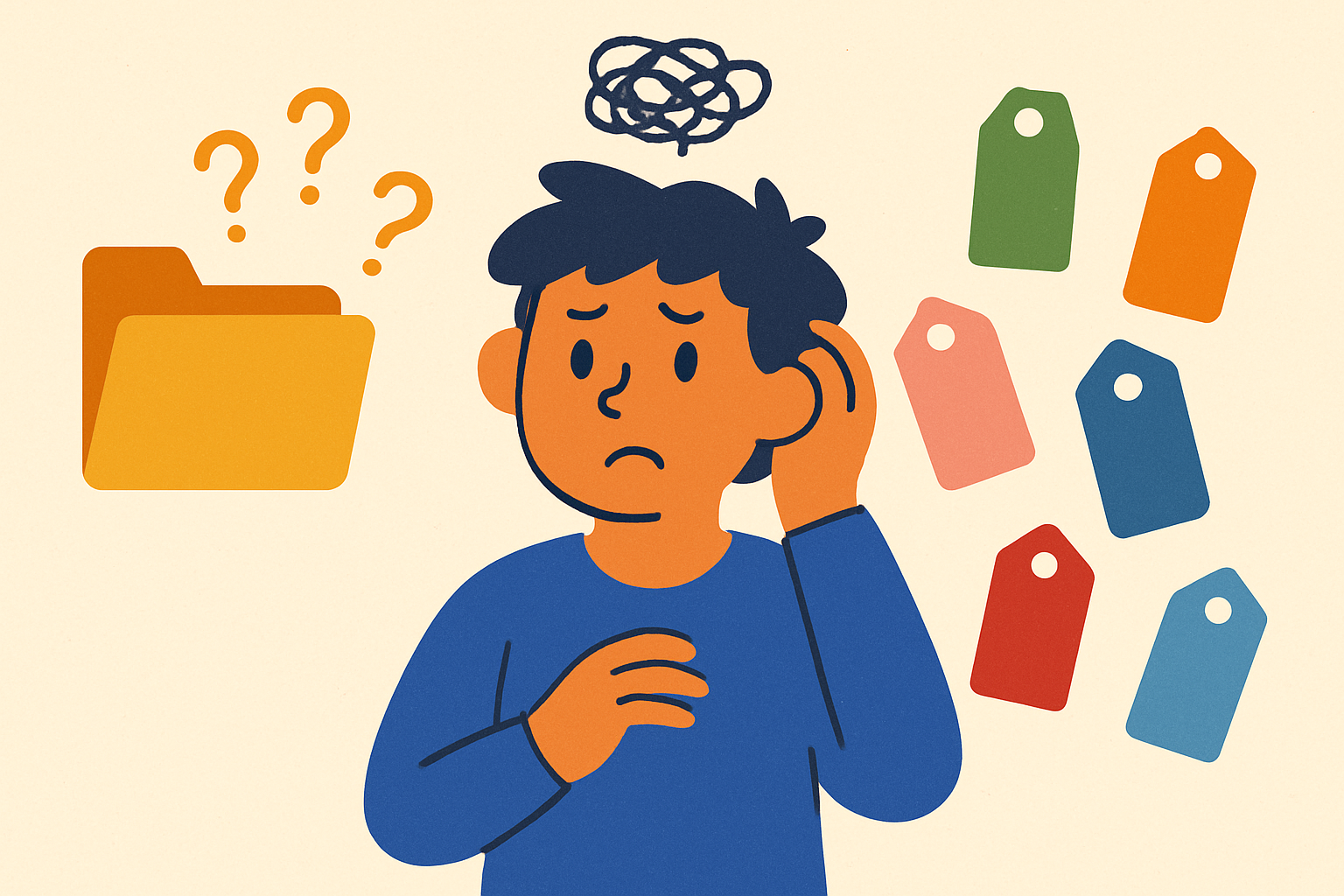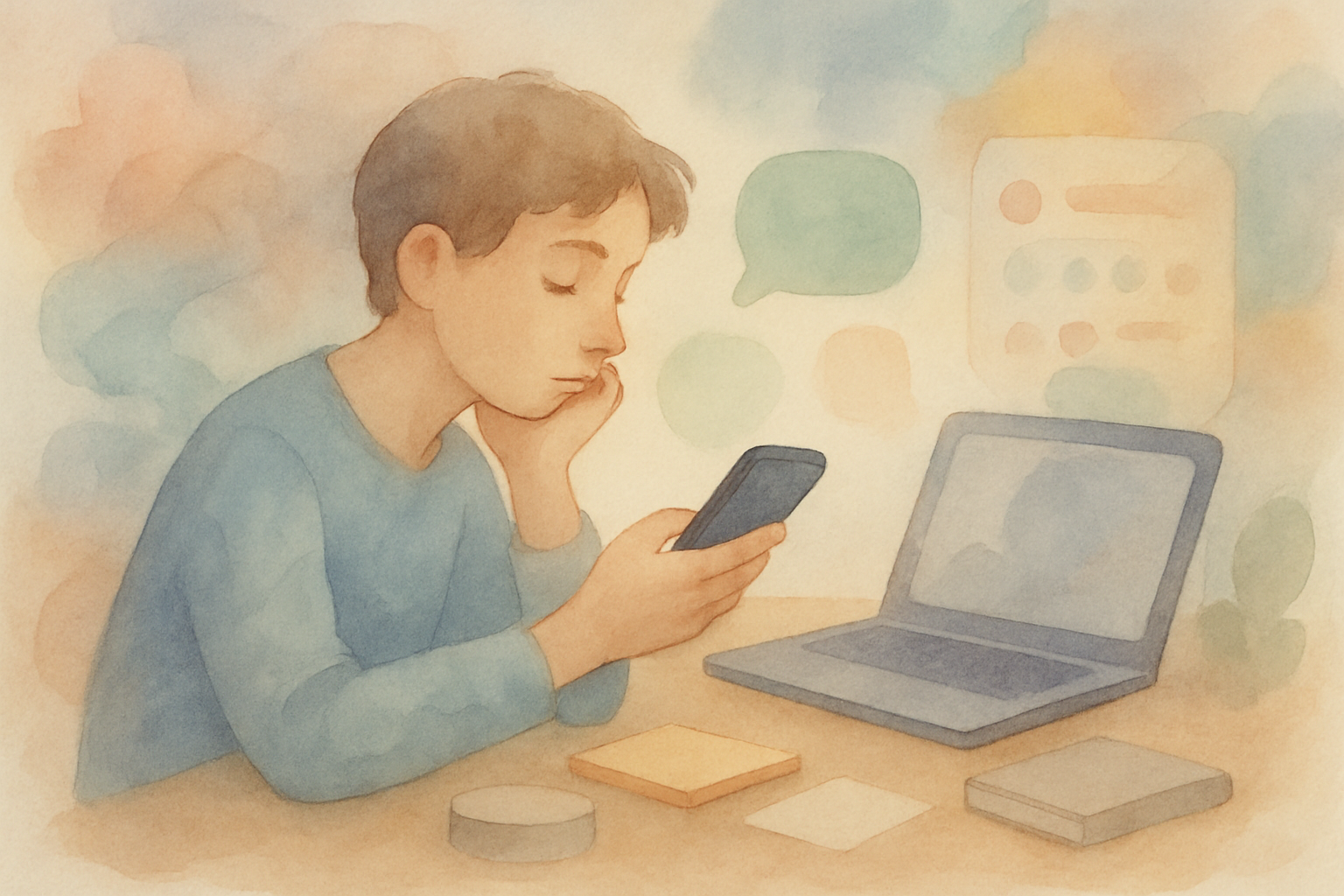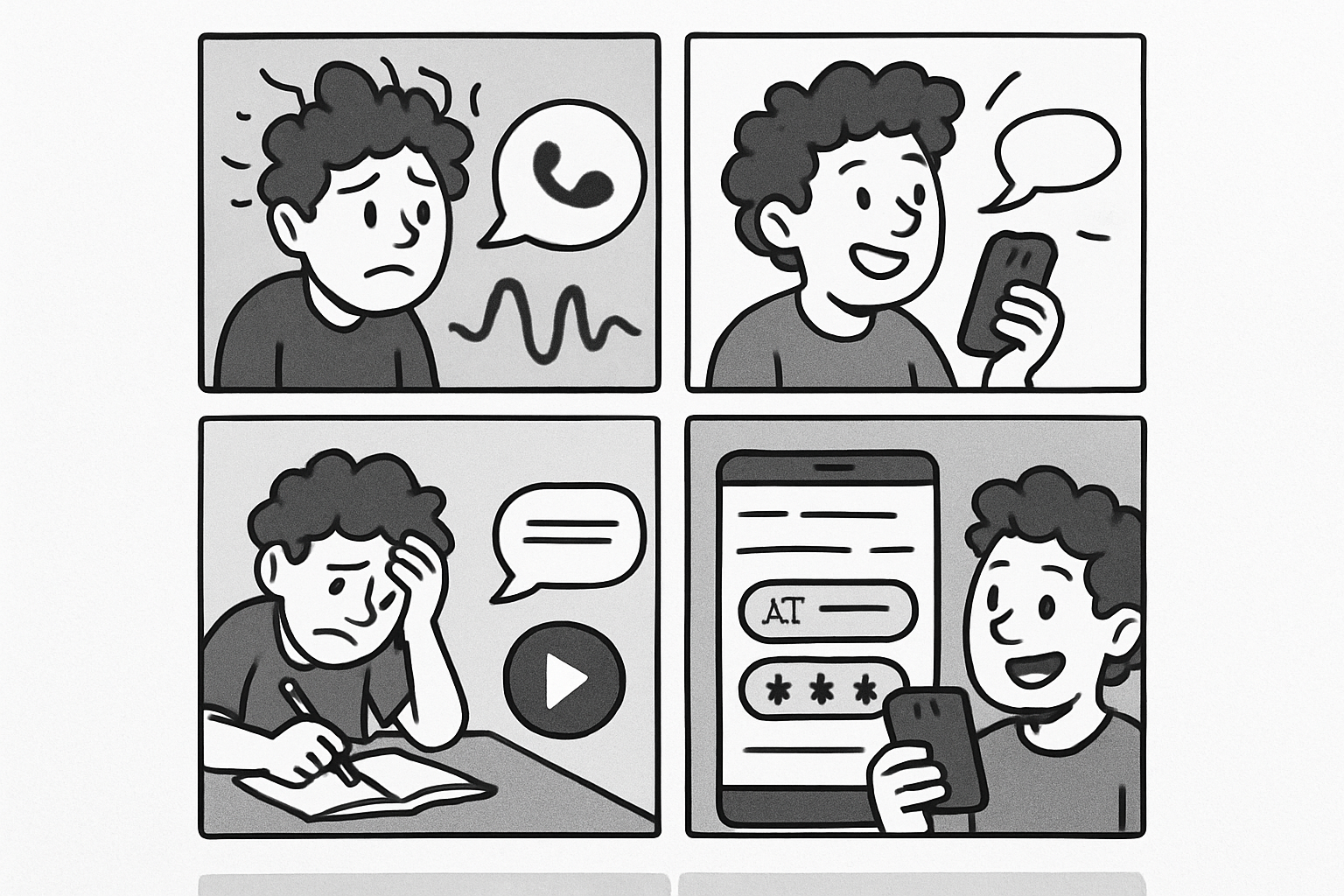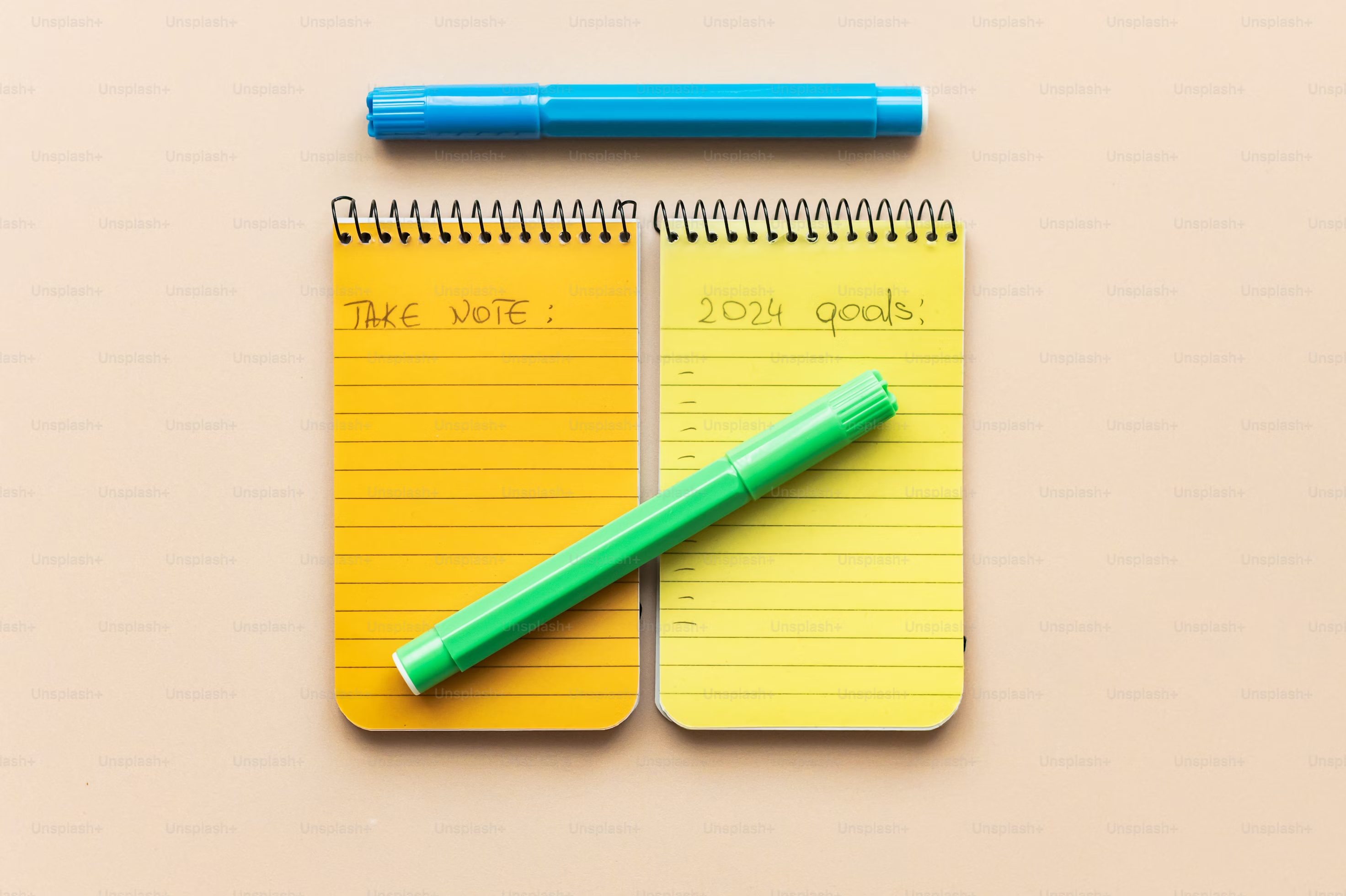Smart Tags vs. Folders: A Better Organization System for Neurodivergent Minds
Struggling with digital clutter? Discover why traditional folders fail for ADHD and neurodivergent thinking, and learn how a smart tagging system can reduce cognitive load and finally get you organized.

Smart Tags vs. Folders: A Better Organization System for Neurodivergent Minds
Ever feel like you're drowning in digital files, notes, and tasks? The universal struggle with digital clutter is real, but for many neurodivergent individuals, especially those with ADHD, traditional folder systems can feel incredibly frustrating and ineffective. In fact, recent research highlights that over half of neurodivergent creatives report significant challenges with time management and organization8. While intuitive for some, these systems often clash with unique cognitive differences, leading to more chaos than clarity.
The core issue lies in their rigid structure: folders demand strict pre-planning and categorization. However, neurodivergent thinking is often non-linear, context-dependent, and highly fluid. This mismatch frequently results in wasted time, increased stress, and a persistent feeling of being unorganized.
What if there was a different way? This article will dive into why traditional folders often fall short, highlight the powerful benefits of smart tags as a flexible alternative, and introduce you to Yaranga, a tool designed specifically with neurodivergent organizational needs in mind.
Why Traditional Folders Fall Short for Neurodivergent Brains
For many neurodivergent individuals, common challenges like executive dysfunction, working memory issues, and difficulty with initiation directly impact organizational abilities6. Traditional folder systems, unfortunately, tend to exacerbate these very challenges. Community discussions validate this, with many neurodivergent users sharing how overwhelming rigid folder structures can be, expressing a clear preference for tools that support flexible search and tagging over nested folders1.
Rigidity: Folders force you to decide *exactly* where something goes before you even file it. This can be a huge hurdle for those who struggle with planning or initiating tasks, often leading to procrastination or files just sitting unsorted.
Single Location: Information is typically confined to one folder. If you forget the "correct" category, or if an item logically belongs in multiple contexts (e.g., a meeting note relevant to two different projects), traditional folders make it hard to find.
Hierarchical Complexity: Deeply nested folders can quickly become overwhelming. The "out of sight, out of mind" phenomenon is particularly pronounced when important items are buried several layers deep, making retrieval a chore.
Maintenance Overhead: Keeping folders tidy and up-to-date requires consistent, sustained effort. This ongoing management can be a significant challenge when energy and focus fluctuate. Many practical tips for neurodivergent students, such as using color-coded or task-labeled folders, are essentially workarounds that try to adapt an inherently difficult system3.
Traditional folder systems can often create more cognitive load than they relieve. This is especially true for brains that thrive on flexibility and contextual connections rather than rigid hierarchies, a challenge that contributes to the high unemployment rates (around 85% for adults with autism) seen in environments with inflexible structures9.
To understand more about how smart tagging can reduce cognitive load for neurodivergent users, you might find this helpful: Deep Dive: How Yaranga's Smart Tagging Reduces Cognitive Load.
The Flexibility and Power of Smart Tags
Enter smart tagging: an organizational approach where items are assigned descriptive keywords or 'tags' instead of being placed in a single, fixed location. This system is better aligned with non-linear thinking and is increasingly recognized in human-computer interaction research as a way to support cognitive flexibility7. This approach offers profound benefits for diverse thinking styles:
Contextual Organization: Unlike folders, items can have multiple tags. This allows a single document to be relevant to "Project X," "Client Y," and "Meeting Notes," truly reflecting its multifaceted nature.
Search & Filter Focused: Organization shifts from remembering *where* you put something to *finding* it based on keywords. This aligns beautifully with non-linear thinking, where recall is often context-driven and associative.
Non-Linear Connections: Tags create flexible relationships between items that would never sit together in a rigid folder hierarchy. Expert advice for those with ADHD often emphasizes digital tools like Todoist that use labels (tags) and filters to compartmentalize tasks visually without relying on folders4.
Reduced Pre-Planning: Smart tagging supports a "capture first, organize later" philosophy. While tags offer great flexibility, it's worth noting they can become cluttered without careful management, a nuanced point for successful implementation2.
The flexibility of smart tagging can significantly enhance how individuals with non-linear thinking styles approach information management. By focusing on context and keywords, it mirrors a more natural way of thinking and recalling information.
Yaranga: A Smart Tagging System Built for Clarity, Not Clutter
Understanding these organizational challenges, Yaranga was designed as a simple, task-based note-taking application specifically for busy and neurodivergent minds, particularly those with ADHD. It brings together notes and tasks in one unified platform, embracing a "capture first, organize later" philosophy through intelligent tagging, actively moving away from the limitations of traditional folders.
Yaranga's Key Features for Smart Organization:
Yaranga's design directly embodies the smart tagging approach and offers features that significantly benefit neurodivergent users:
Quick Add Notes (Voice/Text, Auto-transcribe): Enables low-friction capture of thoughts and ideas on the go, whether typed or spoken. Voice memos are automatically transcribed, ensuring no insight is lost.
Automatic Tagging/Organization: Yaranga intelligently handles some of the organizational heavy lifting for you, reducing manual effort and decision fatigue.
Auto-Extraction of Tasks, Dates, Hashtags: From unstructured notes and messages, Yaranga automatically identifies and pulls out actionable items, dates, and relevant hashtags, structuring your content and creating tags and actions effortlessly.
Unified Notes and Tasks: By combining notes and tasks, Yaranga reduces the need for constant context switching between different apps. Related information stays together, reinforcing the interconnectedness that smart tags facilitate.
Integrations (Email, Calendar, WhatsApp, Telegram): Seamlessly pulls incoming messages and events into the central system, where they can be easily tagged and connected to your existing notes and tasks.
Yaranga Pricing Plans:
Yaranga offers flexible plans to suit different needs, ensuring you can find an option that fits your organizational journey:
Plan | Price | Key Features/Limits |
|---|---|---|
Free | $0 forever | Includes space for your first notes and projects, Task management essentials. |
Pro Plan | $5 per month | Unlimited notes, Unlimited projects, Advanced task management, Voice memos, Team collaboration, Mail/WhatsApp/Telegram integrations. |
For Early Adopters | $99 Lifetime Deal | All Pro features, plus the ability to vote on new features. |
Ready to see how Yaranga can simplify your digital life? Follow our Getting Started Guide for Yaranga: A Step-by-Step Tutorial.
How Yaranga's Approach Supports Neurodivergent Productivity
Yaranga's smart tagging system is designed to address the unique challenges faced by neurodivergent individuals. By providing tools that align with their cognitive strengths, it can help reduce the immense pressure that leads many to "mask" their neurodivergence at work—a practice reported by 90% of neurodivergent employees8.
Reduces cognitive load: Eliminates the mental strain of rigid filing decisions. You simply capture, and Yaranga helps organize, freeing up valuable mental energy.
Facilitates flexible information retrieval: Find what you need based on keywords and current context, rather than trying to remember an exact location within a complex hierarchy.
Supports the 'capture first' need: Ideas can be quickly jotted down or spoken before focus shifts, ensuring no valuable thought or task is lost due to an inability to immediately categorize it.
Helps connect related thoughts and tasks: Regardless of when or how they were captured, smart tags link interconnected pieces of information, revealing patterns and relationships that might otherwise be missed.
Provides a central hub: Reduces the mental overhead of juggling multiple systems, keeping all your essential information in one accessible place, which is a key principle in building neuro-inclusive digital environments12.
Reducing cognitive load is paramount for sustainable productivity, especially for neurodivergent users. Yaranga's design minimizes decision fatigue and streamlines workflows, allowing your brain to focus on important tasks rather than organizational minutiae. For more strategies, explore Productivity Tips for Neurodivergent Minds: Leveraging Yaranga's Features.
Conclusion
Traditional folder systems, with their rigid, hierarchical demands, can often be a poor fit for the non-linear, context-driven thinking patterns common in neurodivergent individuals. In contrast, smart tagging offers a far more flexible, intuitive, and contextual alternative, empowering you to organize information in a way that truly works with your brain.
Tools like Yaranga are specifically designed with these needs in mind, offering a system built on efficient capture and intelligent smart tags. Choosing the right organizational tool isn't about forcing yourself into a system that fights your natural cognitive patterns, but about finding one that complements and enhances them, leading to sustainable productivity and reduced overwhelm.
Take the first step towards a less cluttered digital life and discover a system that aligns with your unique mind. Explore smart tagging systems and consider trying Yaranga as a solution tailored to neurodivergent organizational styles.
Discover How Yaranga Simplifies Organization for Neurodivergent Minds
Get Started with Yaranga Today
References
Smartsheet Community. "Organizing Folders/Workspaces for Non-Linear Brains." community.smartsheet.com
Konik, Eleanor. "Yet Another Hot Take on 'Folders vs Tags'." eleanorkonik.com
Additude Magazine. "School Organization Tips for Students with ADHD or LDs." additudemag.com
Innovative Counseling Partners. "Effective Strategies For Planning And Organizing With ADHD." innovativecounselingpartners.com
Streamlined Living Ohio. "Getting Organized With ADD / ADHD." streamlinedlivingohio.com
"Executive Functioning Challenges in Adults With Attention Deficit Hyperactivity Disorder," Journal of Clinical Psychology. (Accessed via academic databases).
"Digital Tools Supporting Cognitive Flexibility in Neurodiverse Populations," Human–Computer Interaction Journal. (Accessed via academic databases).
PR Newswire. "New Research Finds the Creative Industry Is Failing Neurodivergent Talent." prnewswire.com
Gitnux. "Neurodivergent Statistics." gitnux.org
"Empowering People with Intellectual and Developmental Disabilities through Cognitively Accessible Visualizations." arxiv.org
Gallup. "Neurodiverse Workers: Hidden Challenges, Untapped Potential." gallup.com
Lexxic. "Building Neuro-inclusive Teams in the Digital Age." lexxic.com




